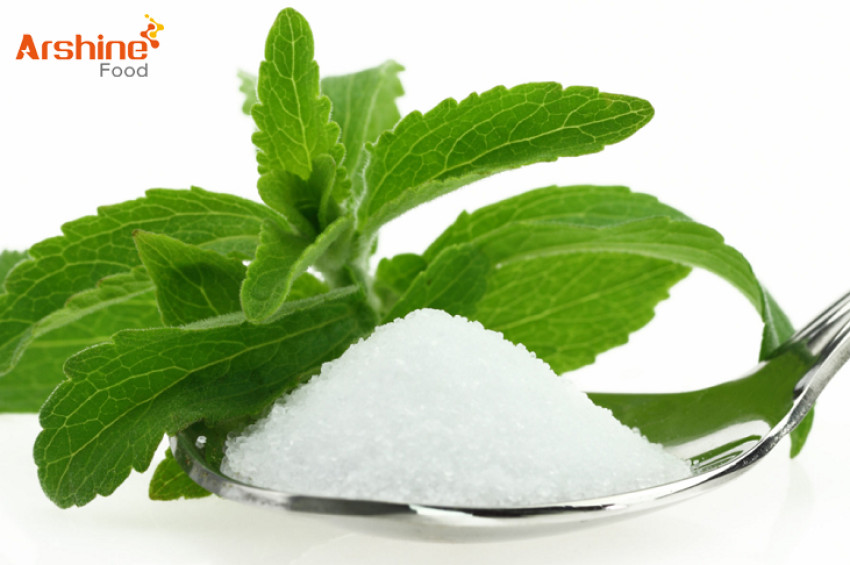
As a sweetener with high sweetness and low GI, steviol glycoside is an ideal substitute for sucrose, and has been widely used in food and beverages worldwide in recent years. However, in addition to providing sweetness, steviol glycosides also have many excellent pharmacological and physicochemical functions, which have high potential application value.
Physicochemical functions of steviol glycosides
1. Stabilizer
Studies have found that steviol glycoside has significant surface activity and is a new type of natural surfactant. When used in combination with soybean protein, it can significantly improve the interface activity of protein and the stability of emulsion and foam.
2. Antibacterial agent
Steviol glycosides have antibacterial properties, can inhibit the growth of a variety of bacteria, and are beneficial to prolong the shelf life of food. It can also be used as a protective agent to prevent potassium sorbate, a highly safe and commonly used preservative, from being destroyed in aqueous acidic systems, thereby improving the antibacterial effect. Steviol glycosides also have the ability to inhibit non-enzymatic browning reactions. Efficacy, will not cause fermentative rancidity.
3. Flavoring agent
Steviol glycosides like acid, used in fruit wine can improve the flavor of fruit wine, make it sour and sweet, and change the viscous feeling of fruit wine. When used in fruit wine such as seabuckthorn and grape, the taste is better than sucrose; when added to white wine, it can eliminate The spicy taste in it improves the quality of the product; when used in beer, it can increase the foam while improving the flavor of the product, making the beer foam rich, white and long-lasting; adding steviol glycosides to pickled products can also inhibit its salty taste Too high and shorten the marinating time.
4. Precursor substances
Steviol glycosides have the aglycon structure of kaurene, and steviol and isosteviol can be obtained by simple hydrolysis. Using this as a lead compound, further derivatization can obtain the protection of heart and brain cells, antibacterial, anti-inflammatory, anti- Biologically active substances such as tumors. Therefore, the modification and transformation of steviol and isosteviol by means of biocatalysis and chemical catalysis has become one of the application research directions of steviol glycosides.
Pharmacological effects of steviol glycosides
1. Lowering blood pressure and blood sugar
Studies have shown that the principle of steviol glycosides in lowering blood pressure is mainly due to three aspects: reducing the influx of extracellular Ca2+, reducing the absorption of Na+ and the production of prostaglandins, a secondary vasodilator. After 2 years of taking steviol glycosides to adult patients with essential hypertension, the study found that the systolic and diastolic blood pressure of the patients were significantly reduced.
In addition to meeting the sweetness needs of diabetics, steviol glycosides also have the effect of adjuvant treatment of diabetes: including stimulating the secretion of insulin and the sensitivity of surrounding tissues to insulin, promoting the metabolism of glucose in the blood, and inhibiting the key enzymes of glucose synthesis in the intestinal tract. Reduce blood sugar input.
2. Anti-tumor
Studies have found that steviol glycosides have a protective effect on epithelial cell shedding and hyperplasia caused by histamine damage to the gastric mucosa, which may be related to the fact that steviol glycosides can inhibit gastric secretion or directly inhibit the secretion of pepsin. The mixture of steviol glycosides can inhibit the formation of mouse skin cancer caused by dimethylbenzanthracene (DMBA), which shows that it has the effect of preventing tumor occurrence.
3. Protect the intestinal tract
The indigestibility and non-fermentability of steviol glycosides can promote the maintenance of normal intestinal ecology, promote the proliferation of bifidobacteria and lactobacilli in the human body, inhibit E. coli and other pathogenic bacteria, and have a good preventive effect on constipation and rectal diseases. Dilute the toxic substances in the human body, thereby preventing the occurrence of cancer diseases.
03
summary
Steviol glycosides are currently well recognized in European and American markets. my country is the largest producer of steviol glycosides in the world, but nearly 80% of steviosides are exported. In 2018, my country's stevia extract continued to rank first in the export list of plant extracts, with an annual export value of 260 million US dollars, a year-on-year increase of 10.94%.
https://www.arshinefood.com/detail/Industry-Information/steviol-glycosides.html





